Comprehensive Guide: Top 10 Things to Do in San Pedro de Atacama and the Atacama Desert?

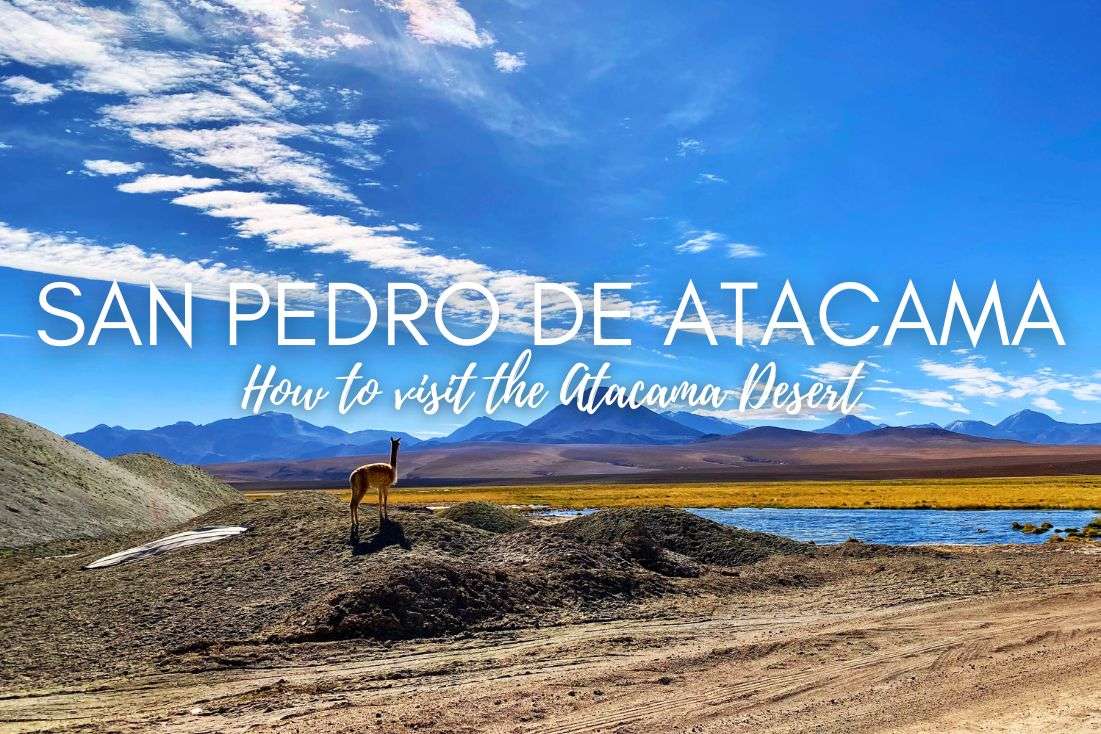
I wasn’t sure about adding San Pedro de Atacama to my itinerary at first, but my travel partner insisted, so into the desert we went. And I was hooked—the Atacama Desert turned out to be one of the top spots to see in Chile, and dare I say one of the top places to visit in South America! Learn more about Chile.
In this article, I’ll tell you what you absolutely have to do in San Pedro de Atacama and how to visit the Atacama Desert on your own.
Do not miss these 10 things to do in San Pedro de Atacama:
- Putana River Ford (Vado Río Putana): Perfect for sunrise views and chill atmosphere.
- El Tatio Geysers: World’s highest geyser field with cool sunrise steam.
- Miscanti and Miñiques Lagoons: Picturesque lagoons at the foot of volcanoes.
- Laguna Chaxa Park: Flamingo haven with nearby lagoons Ojos del Salar and Laguna Tebinquinche.
- Los Flamencos National Reserve: You can tell by the name who the famous residents are...
- Puritama Hot Springs: Natural hot pools with therapeutic benefits.
- Devil’s Throat (Garganta del Diablo): Superb canyon for hiking with alien-planet vibes.
- Pukará de Quitor Fortress Ruins: Atacameño citadel with valley views.
- Mars Valley (Valle de Marte): Ideal for sandboarding and surreal sci-fi-like landscapes.
- Moon Valley (Valle de la Luna): More otherworldly landscapes.
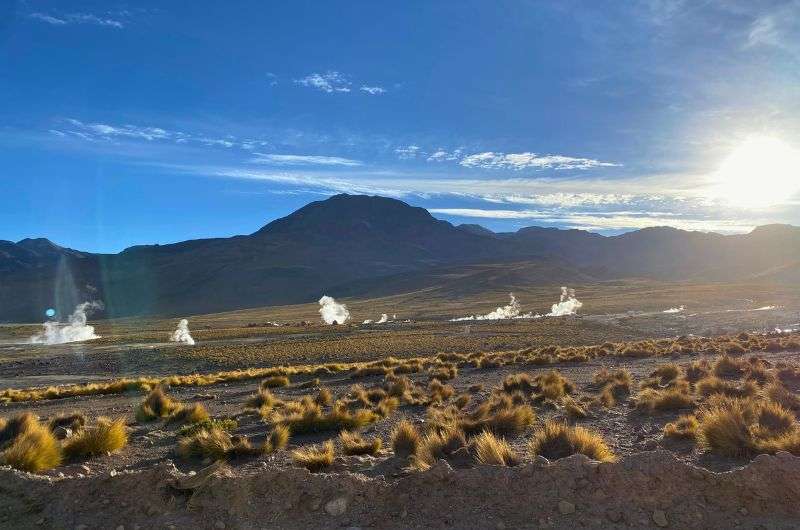
Geyser field in San Pedro de Atacama
Is it worth visiting San Pedro de Atacama?
Yes, the Atacama Desert is a must-see destination in Chile and one of the most memorable places in South America. San Pedro de Atacama is something like the tourist mecca of the Atacama Desert. Why? It’s packed with epic views, extraordinary landscapes, and thrilling experiences.

Sometimes, all you need to do is take the first step... I've filtered out the best hotels in San Pedro de Atacama for you
Save it for yourself to come back to later, or share with your friends on social media!
I've already planned your ititnerary for the trip, complete with my travel tips.
Map of Atacama Desert Chile
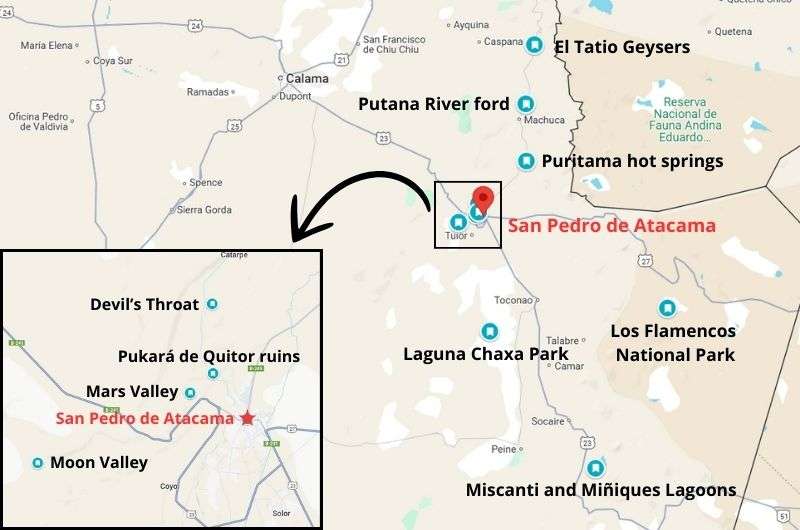
Here are the 10 things to do in San Pedro de Atacama that shouldn’t be missing from your Atacama Desert itinerary
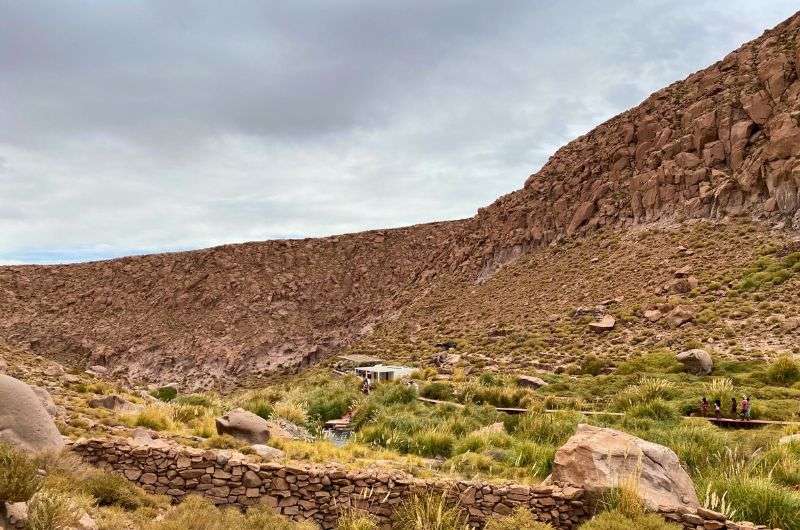
Come in the fall or spring and Atacama Desert experience will be perfect
My quick tips on visiting San Pedro de Atacama:
- Stay for 4–5 days: To fully enjoy San Pedro de Atacama and its surroundings, plan to spend 4 to 5 days there. This gives you time to adjust to the altitude and fit in highlights like the Valle de la Luna, El Tatio Geysers, and the Altiplanic Lagoons without rushing through all the amazing things to do in San Pedro de Atacama.
- Best months to visit: Aim for March-May (fall) or September-November (spring) for the best weather and fewer crowds at the tourist hotspots in the Atacama Desert. These months are the Goldilocks of desert travel—not too hot, not too cold, and the tourist crowds are thinner than in peak season. Skip the Chilean summer vacation rush in December and January.
- Be ready for that Atacama Desert weather: The Atacama Desert is a drama queen when it comes to temperatures. By day, it’s a toasty 77°F to 86°F (25°C to 30°C) in the summer, but once the sun clocks out, temperatures plummet fast. Nights can drop to a chilly 41°F (5°C), especially in winter. Layering is key! Pack like you’re dressing for both a beach party and a winter bonfire.
- Yes, there are animals in the Atacama Desert: Believe it or not, this seemingly barren landscape is teeming with life! Keep your eyes peeled for flamingos chilling out in the salt flats, vicuñas (think llamas, but cuter and sassier) grazing in the altiplano, and if you're lucky (or unlucky, depending on your feelings about rodents), you might spot a vizcacha—a desert bunny with a tail.
Best hotels in San Pedro: Where to stay in the Atacama Desert?
You’ll be surprised by the number of amazing hotels in the Atacama Desert. There are plenty in San Pedro’s town center, but those further out make sure to use the extra real estate by turning their properties into proper desert oases! Here are 3 top hotels in San Pedro as chosen by me:
- I stayed at the stylish 4-star adult-only hotel Desértica. It was like a desert refuge, but still close to the town center. The “huts” are amazing, and, as a bonus, your room will be round! The pool area is a perfect spot for an evening cocktail.
- Right in the heart of the Old Town is the lovely Terrantai Lodge. The inner courtyard is peaceful with a small outdoor pool. The food is exquisite and the complimentary wine and tapas from 6 to 8 pm are the cherry on the top!
- For a bit of a splurge, take a look at Tierra Atacama. It’s to the south of the city center and the outdoor pool and hot tub comes with amazing views of the Andes. The higher price tag also gets you eco-friendly designer rooms and an intimate atmosphere.
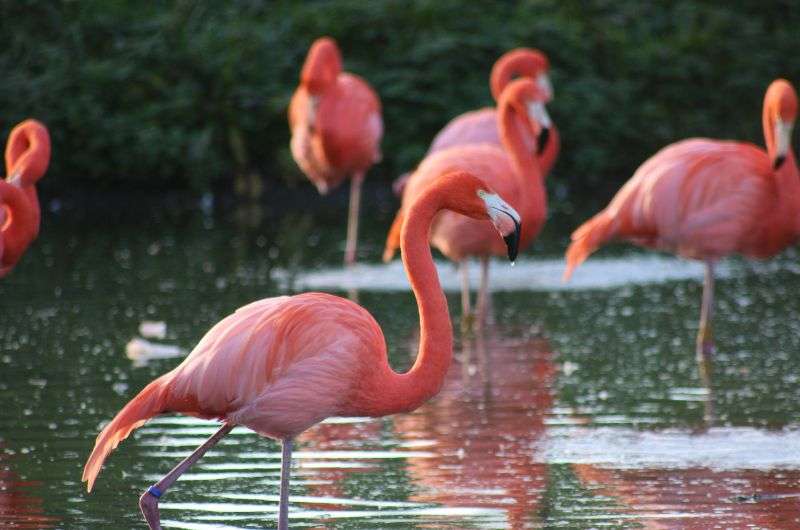
In San Pedro de Atacama, you will certainly come across these pink beauties
Where is the San Pedro de Atacama and how to get there?
The Atacama Desert is in northern Chile, stretching across a surreal landscape bordered by the Andes Mountains to the east and the Pacific Ocean to the west. San Pedro de Atacama is a charming (albeit dusty) little town that serves as the hub for exploring the desert.
The nearest airport is El Loa Airport in Calama, about 100 km (62 miles) or an hour’s drive northwest of San Pedro de Atacama. From there, you’ve got two options:
- Rent a car: Highly recommended and the best way to travel if you ask me. Not only is it more comfortable, but having your own wheels is a game-changer for exploring the desert. You’ll want the freedom to visit remote sites like the Valle de la Luna, El Tatio Geysers, and the salt flats on your own schedule.
- Take a shuttle bus: Budget-friendly shuttle buses are a popular option for getting to San Pedro de Atacama. The downside is that once you’re in town, you’ll need to join tours or find other transport to visit the top sights. If you’re all about convenience and flexibility, a rental car wins hands down.
Pro tip: Gas stations are rare, so always fuel up in town before heading into more distant parts of the desert!
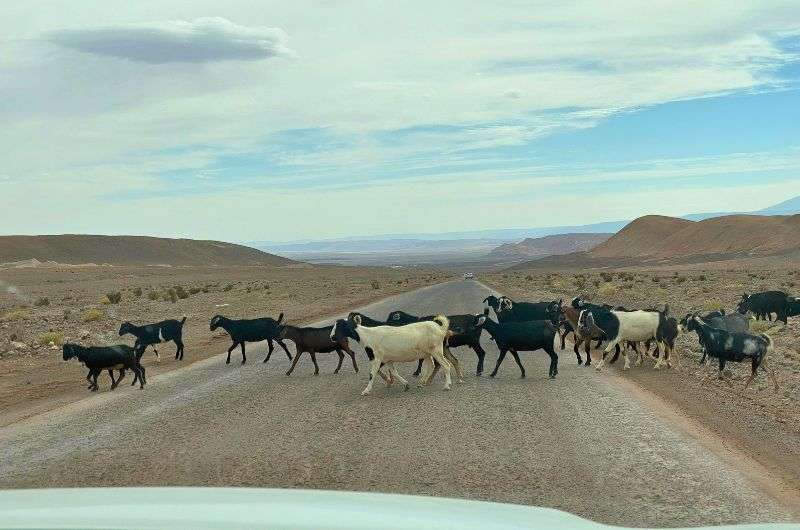
Drive to San Pedro de Atacama. Trust me, it's better to be self-sufficient. Just watch out for the goats
Whether you’re looking for extended adventures or quick day trips, here are the best things to do in San Pedro de Atacama, all of which I personally visited and can confidently recommend to you:
1. Putana River ford (Vado Río Putana)
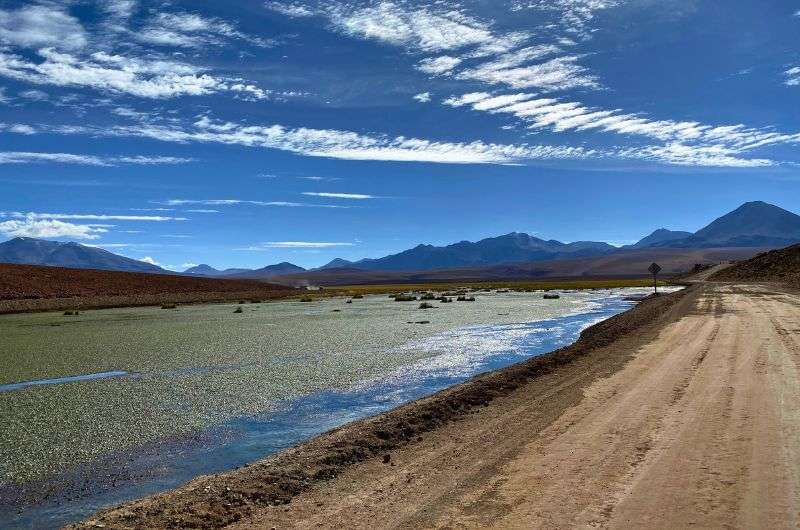
Something about the colors at Vado Río Putana made me stop in my tracks and just stare
Distance from San Pedro de Atacama: 54 km | 34 miles | 1-hour drive
On my way to see the El Tatio geysers, I made a few stops to fully immerse myself in the breathtaking scenery the Atacama offered to us. One of them was the Vado Río Putana viewpoint. Initially, I thought that I was just going to drive to El Tatio and back again, so this stop was totally spontaneous, and ended up being the best type of surprise. Simply gorgeous.
The unique atmosphere of this place is not something you can simply capture in a photo, so even though my shots are awesome, they’re nothing compared to the real-life experience.
Maybe it was the sunrise light sparkling on the pampa dew, who knows, but for me, I liked the Vado Río Putana viewpoint better than the geysers in the end! One would say there’s nothing to see except the landscapes, but that was more than enough for me.
Pro tip: If you want to dig a little deeper, you can book a tour guide in San Pedro de Atacama that will explain everything about the delicate ecosystem there.
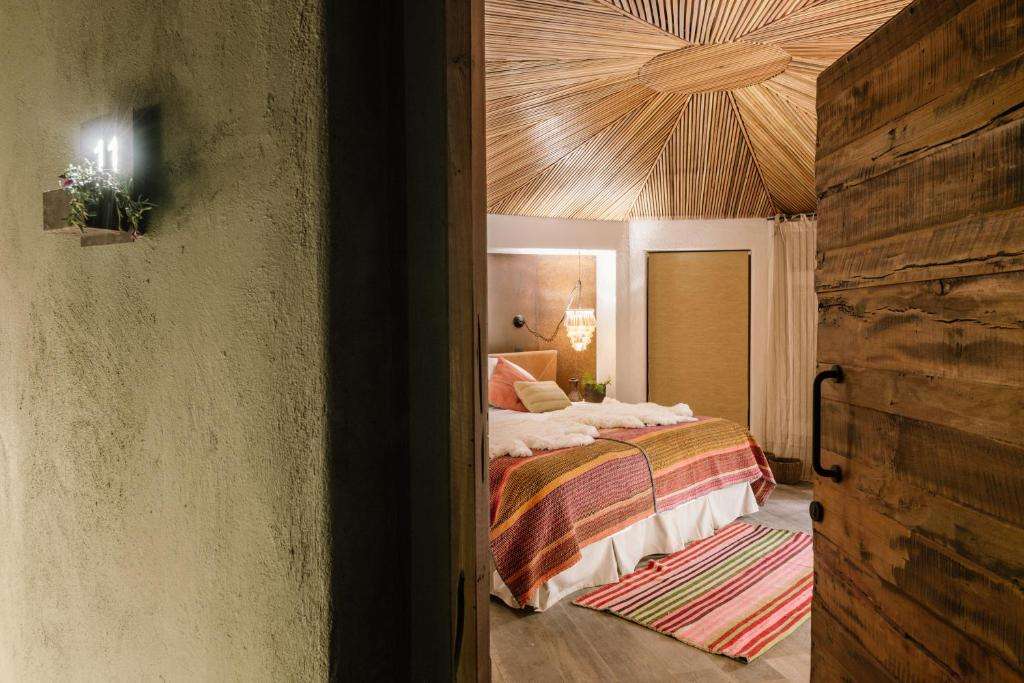
2. Tatio Geysers
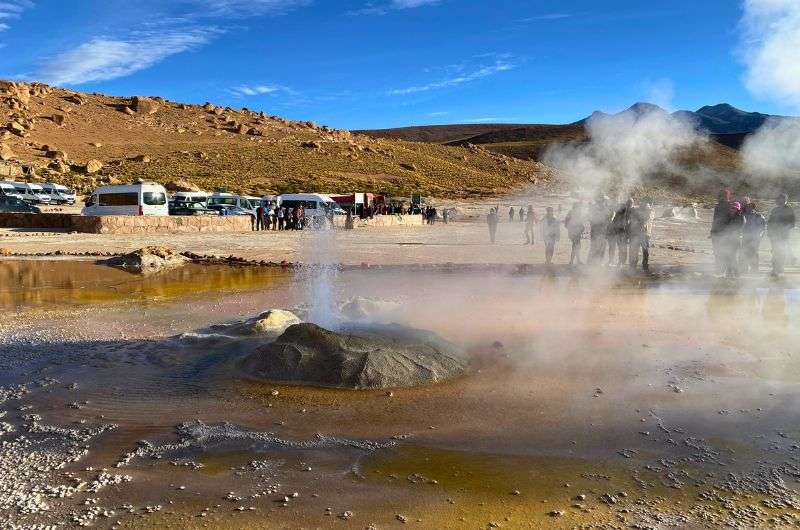
Geysers de Taio
Distance from San Pedro de Atacama: 79 km | 50 miles | 1.5-hour drive
The Tatio Geysers (Geyser del Tatio) is the 3rd largest geyser field in the world (after Iceland and Yellowstone Park). But although the geysers are cool and the intervals between the eruptions are predictable, I liked the route from San Pedro de Atacama better. The drive and stops on it was much less crowded (there were already like 2,000 visitors at El Tatio when we got there in the morning!) and the sunrise in the desert was simply magical.
You need to get up at 4 am to get there in time. The steam from the geysers gets less visible as the day passes. The Tatio Geysers are also the highest in the world, which means it’s really cold up there. You’re still in the desert, but at 4,320 m (14,173 ft) above sea level! The temperature is constantly around 8°C (46°F), so I strongly advise wearing layers.
- Entrance fee in 2025: CLP 15,000 (USD 15)
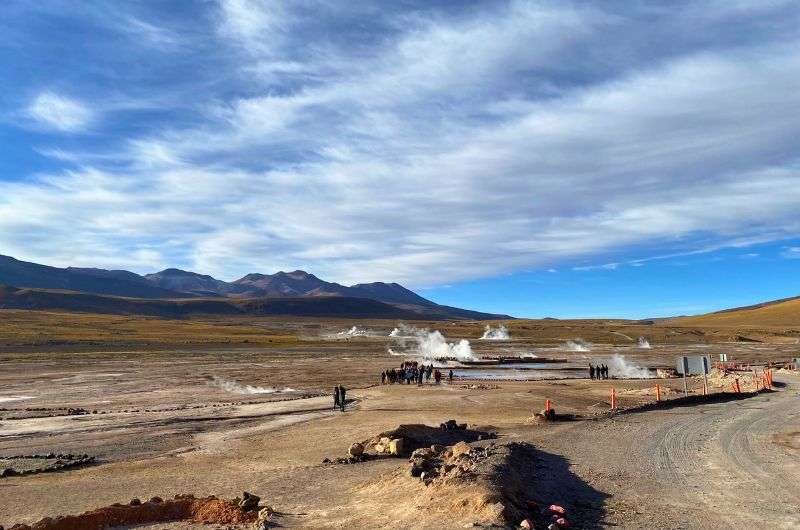
It’s the 3rd largest geyser field in the world
What about altitude sickness?
There is an almost 2,000 m (6 562 ft) difference in altitude between San Pedro de Atacama and El Tatio Gersers. Add jet lag, no time to get acclimatized, and little sleep and you get perfect conditions for Acute Mountain Sickness syndrome. And that’s exactly what happened to my travel partner. She was alright at first but slowly started experiencing facial swelling, headaches, and nausea. So, she quickly went to see the geysers and then spent the rest of the time waiting in the car to go back to San Pedro de Atacama.
Pro tip: Mountain sickness can be harmless when treated properly, but severe if ignored. Chileans have their own life hack when it comes to this—a tea made of coca leaves. It’s bitter as hell but effective.

3. Miscanti and Miñiques Lagoons at the foot of volcanoes
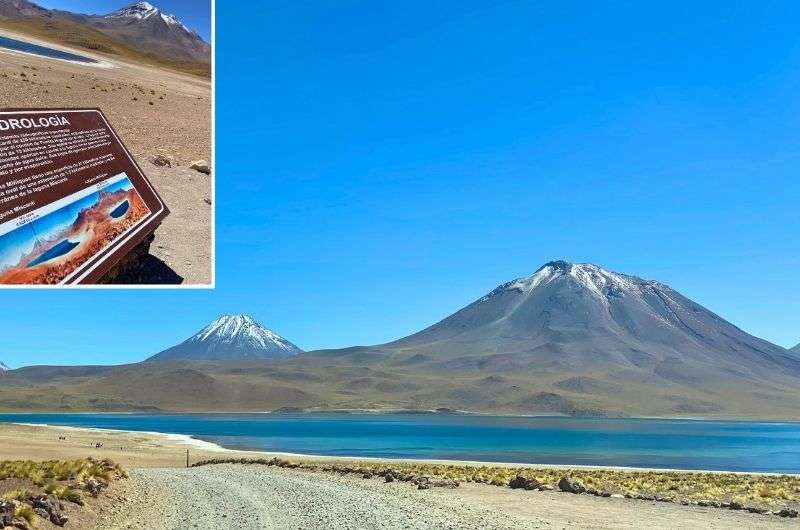
Miscanti and Miniques Lagoons
Distance from San Pedro de Atacama: 116 km | 72 miles | 1.5-hour drive
Miscanti and Miñiques are two lagoons located in the Altiplano region and are part of a landscape shaped by ancient lava flows and surrounded by expansive salt flats, creating a truly unique atmosphere.
Honestly, none of my photos do it justice. You just need to experience the atmosphere there yourself. These two lagoons are special thanks to the lava rock that splits the original lagoon into two. Located at the foot of towering volcanoes and surrounded by the majestic Andes Mountains, the Miscanti and Miñiques lagoons are 118 km (73 mi) south from San Pedro, and one of my favorite things to do there.
Make sure to stop by Socaire village on your way. This peaceful Atacameño community is known for its ancient, terraced fields and traditional way of life, but it’s also facing challenges like water shortages due to nearby mining activities. Buying authentic handicrafts here is a great way to support the locals and preserve their culture.
- Opening times: 9 am to 6 pm
- Entrance fee: CLP 10,000 (USD 10), cash only

4. Laguna Chaxa Park: Salt flats and desert lagoons
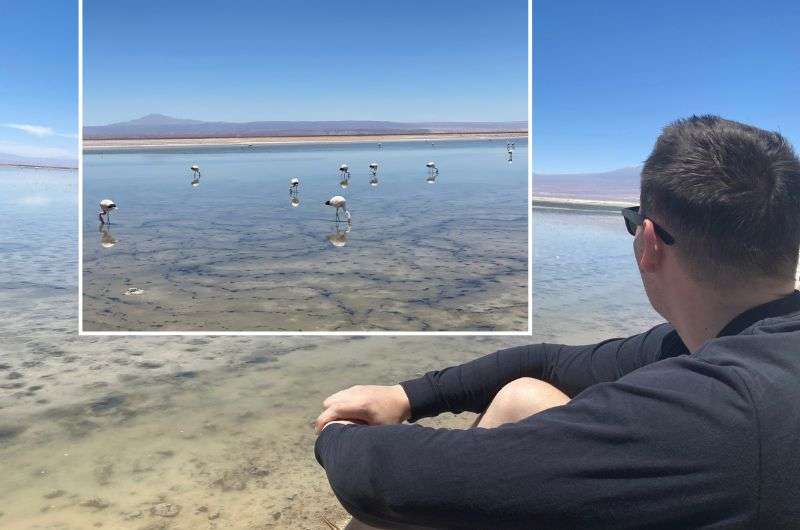
Relaxing...
Distance from San Pedro de Atacama: 123 km | 76 miles | 1 h 45 min drive
Alternative hotel recommendation: Terrantai Lodge Hotel
Laguna Chaxa Park is a part of Los Flamencos National Reserve located 60 km south from San Pedro and includes several highlights. It’s famous for its flamingos, unique lagoons, and expansive salt flats that create a surreal landscape.
Ojos del Salar
The two perfectly round-shaped lagoons on the way to Chaxa lagoon are very popular among tourists. The name literally means “the eyes of Salar” and the reason seems pretty obvious once you see the shape.
I wasn’t particularly thrilled about the idea, but if you want to try out the salty waters (and you’re there on your own, without a guide), you can jump into the water... preferably the left one (as seen from San Pedro). The locals say there’s a rusty car in the right one and you might easily hurt yourself if you don’t know what you’re doing.
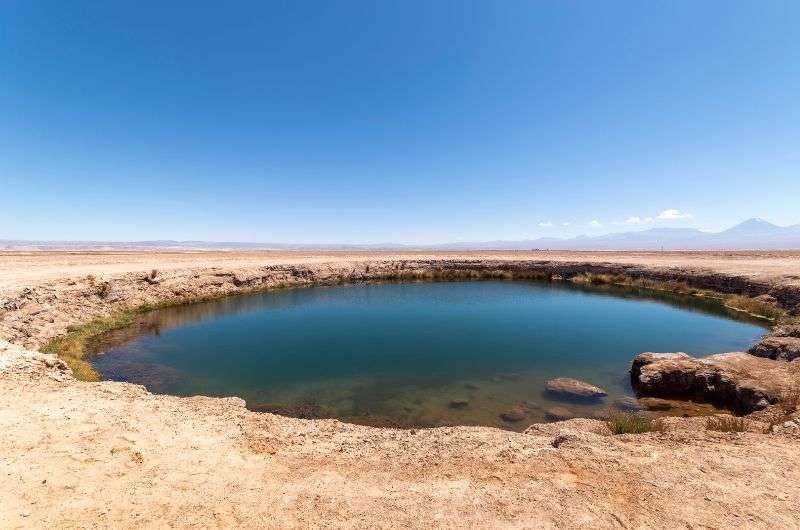
On of the Eyes of Salar
Laguna Chaxa and Laguna Tebinquinche
I passed on taking a dip in the 'eyes' and continued further to the two largest lagoons of the Atacama Salar. Laguna Tebinquinche, surrounded by shimmering salt flats, was the perfect place to soak in the silence of the desert.
As I arrived at Chaxa Lagoon, I could see flamingos chilling (as in Chil-e-ing, haha) in the water and feeding on shrimp. It was hot as heck there, but the view of the birds everywhere, the mountains in the backdrop, and the clear blue sky merging with the water were worth it.
Unfortunately, the salt flat is rich in lithium, and the heavy mining industry together with crowds of tourists endanger the unique biosphere. The park rangers and regulated opening times help, but still, be considerate to the environment and stick to the paved paths.
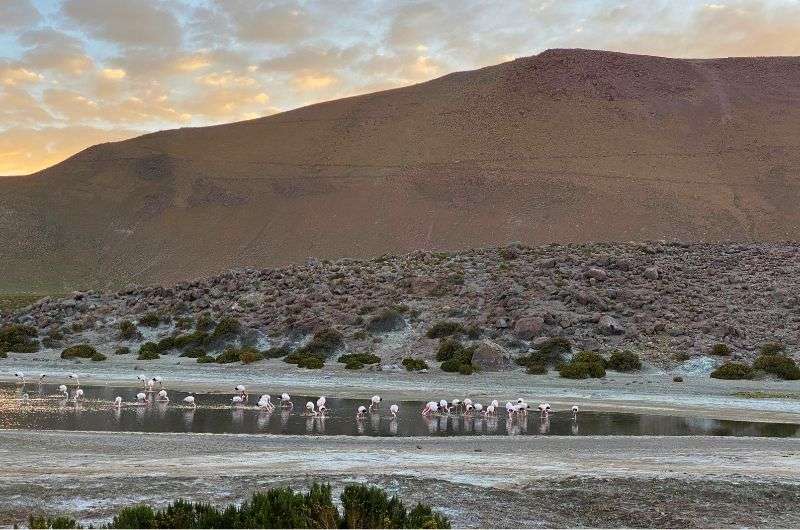
Flamingos!
- Opening times Laguna Chaxa: 7 am to 6 pm (last entry)
- Entrance fee Laguna Chaxa: USD 13,700 (USD 13.50), cash only
- Opening times Laguna Tebinquinche: 9 am to 5:30 pm (with an hour-long break from 1:30 pm)
- Entrance fee Laguna Tebinquinche: USD 5,000 (USD 5), cash only
Pro tip: Bring enough water with you, there is no kiosk or shop on site. If you’re there for the sunset, don’t forget a jacket too, it gets chilly in the evenings.

5. Los Flamencos National Reserve
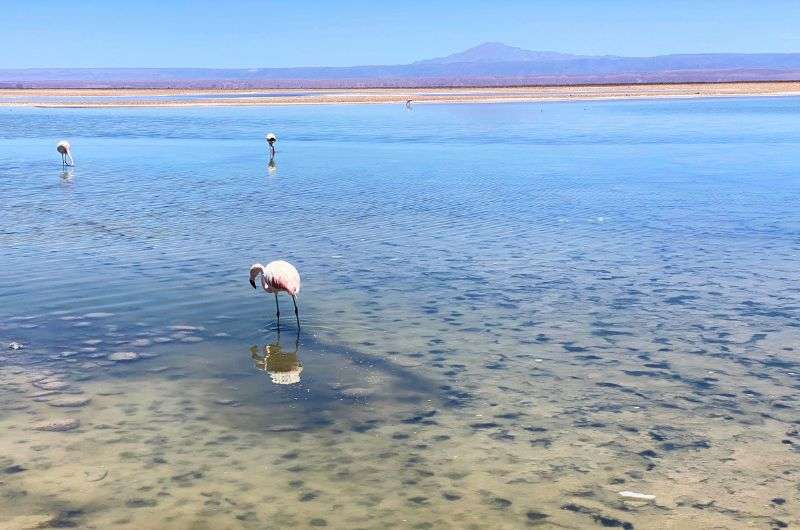
And another pink dude (you’ll see a lot of them)
Distance from San Pedro de Atacama: depending on which sector of the reserve you’re visiting
Los Flamencos is a large national reserve covering an area of 740 sq km (290 sq mi) of salt flats, lagoons, volcanos, and hills on the borders with Bolivia and Argentina. It’s divided into 7 individual parks, all with an altitude of up to 5,000 km (16,404 ft), so there is a pretty high chance of mountain sickness.
The reserve protects a unique ecosystem living there despite the extreme conditions. Perhaps the most famous inhabitants are the flamingos, which after all gave the reserve its name. There are three species: Andean, James, and Chilean, which breed at the salty lagoons rich in small shrimps. Apart from flamingos, you can spot the Andean fox, ducks, and vicuñas.
There are many lagoons, volcanoes, and epic views. Book a guided tour in San Pedro de Atacama, or plan your own day trip by rental car. The sunrises and sunsets are magical there, so try to plan your trip so that you can enjoy the views at the best times.
Pro tip: On the way to Los Flamencos National Reserve, you can visit the astronomical capital—ALMA Observatory, a world-renowned radio telescope array used to study the universe and deep space.
6. Puritama Hot Springs (Termas de Puritama)
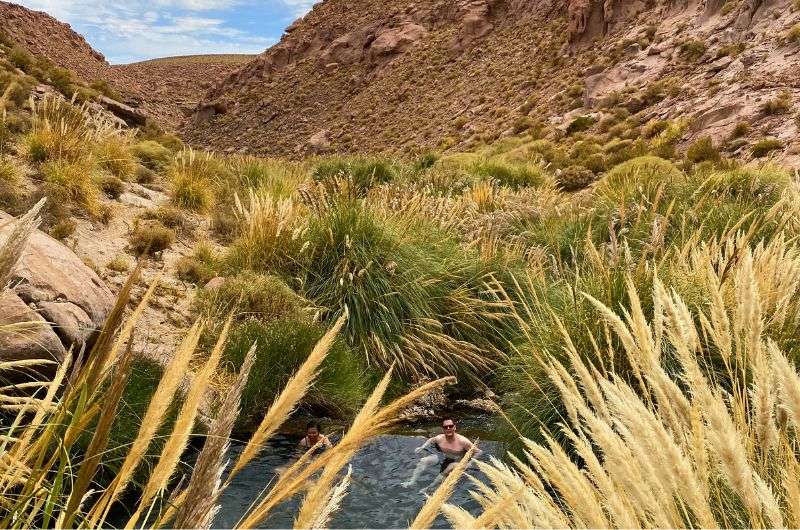
Me in the Puritama Hot Springs
Distance from San Pedro de Atacama: 29 km | 18 miles | 0.5-hour drive
The hotel I stayed at: Hotel Desértica
Puritama Hotsprings (Termas de Puritama) is a MUST while staying in San Pedro. The Puritama Hot Springs are located just 30 km (18.7 mi) northeast of San Pedro, in the heart of the Atacama Desert, and are easily accessible by car as a day trip.
The hot underground water flows into Puritama River and creates eight natural pools for you to hop into. With a temperature around 33°C (91.5°F) and high sodium sulfate content, the springs are said to have a marvelous effect on rheumatism, helping to fight stress and fatigue. Are you experiencing burnout? Soak in the hot waters of Puritama to re-ignite your inner fire!
The Puritama Hot Springs are often packed with tourists, especially in the high season (December to February). Don’t forget to book your visit 2 or 3 days in advance. It's better on-site, but it’s possible to do so online as well, in case you’re not staying in San Pedro de Atacama for so long.
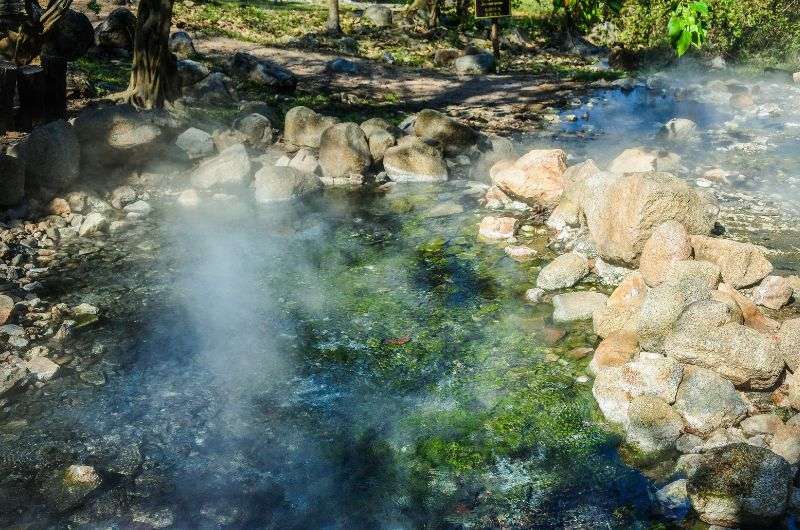
So warm and so relaxing!
- Opening hours:
- Morning session: 9:30 am to 1:30 pm
- Afternoon session: 2:30 pm to 6:00 pm
- Prices: USD 85–100 for a group tour, includes transportation
- What to pack: bathing suit, towel, hat, sunscreen, and flip flops/sandals
7. Devil’s Throat—a canyon like no other
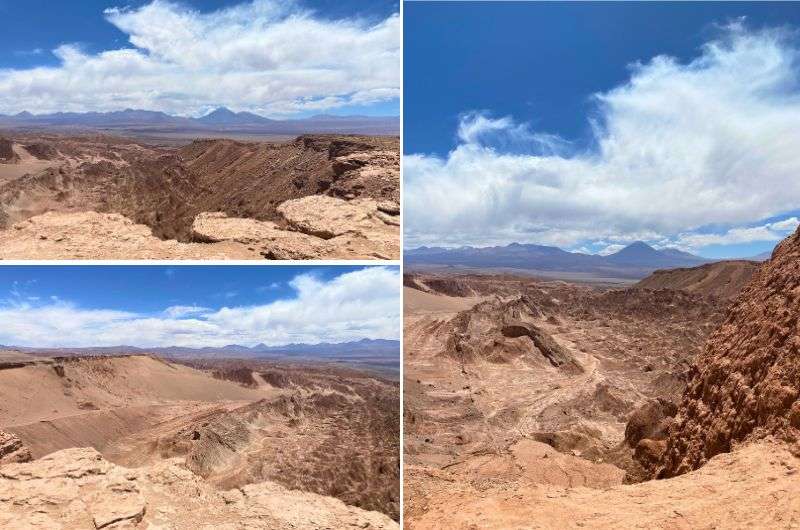
Garganta del Diablo
Distance from San Pedro de Atacama: 6.5 km | 4 miles | 15-minute drive
Around 4 km further north of San Pedro, Devil’s Throat (Garganta del Diablo) is a dramatic rock formation towering over the river canyon. It gave me flashbacks of Death Valley in California, or certain scenes from The Hills Have Eyes. The whole river canyon is accessible by car, bike, or even on foot, as it’s close to the city.
Devil’s Thoat is part of the Catarpe Valley and resembles something straight out of Death Valley, or maybe the set of a post-apocalyptic movie. The narrow canyon walls create an almost claustrophobic atmosphere that’s perfect for those "exploring an alien planet" vibes.
What do people do here? Hiking, mountain biking, and photography are the main attractions. The canyon’s natural paths and sandy terrain make it a fun adventure, and the contrast between light and shadow inside the canyon creates some seriously amazing photo opportunities. Mountain bikers, in particular, love the trail that snakes through the canyon—it’s challenging but rewarding, with views that make all the sweat worth it.
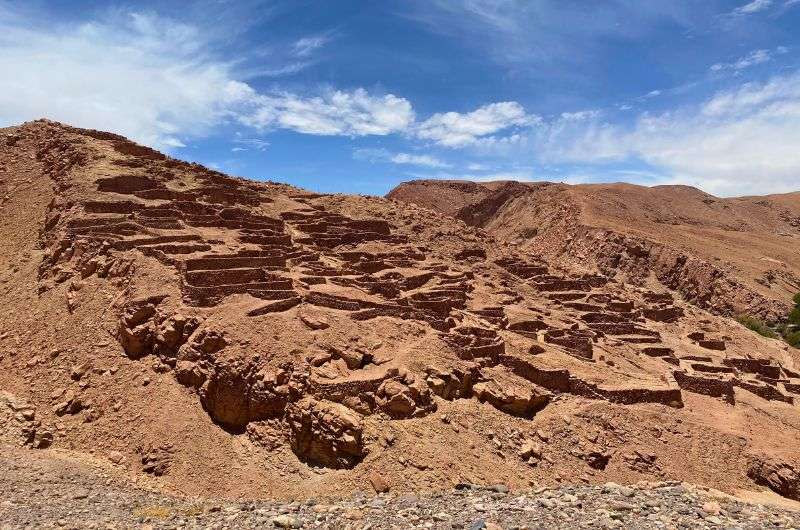
If you want to hike right into the Devil's throat...
There’s a handy hiking trail connecting Pukará de Quitor (an ancient Atacameño fortress, see next item on the list) to Devil’s Throat. If you’re feeling energetic, you can walk the entire route, but if the thought of trekking under the blazing sun makes you wince, just drive. That’s what I did, and it saved me a lot of sunburn and energy. The whole excursion, including time to explore and enjoy both sites, took about 3 hours.
8. Pukará de Quitor fortress ruins
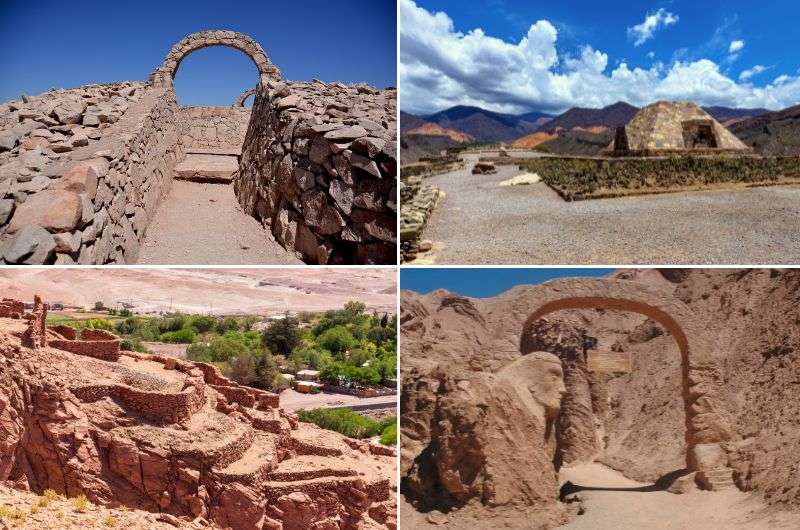
Pukará de Quitor
Distance from San Pedro de Atacama: 4 km | 2.5 miles | 10-minute drive
Stick to the San Pedro River Canyon and visit the monumental rocky fortress of Pukará de Quitor, which has stood guard over the valley for more than 500 years. Built by the indigenous Atacameños, this ancient citadel served as a strategic defense against invaders, including the Spanish conquistadors. Sadly, mud and rock walls were no match for cannonballs, and after a brutal battle, the citadel fell, with many defenders tragically beheaded. I guess that’s one way to display dominance.
Today, the site is a National Monument and offers a glimpse into the region’s history, along with breathtaking panoramic views of the surrounding valley and the distant Andes. The climb up to the top is a bit steep, but it’s manageable for most visitors and well worth the effort.
It’s an easy 3 km (1.8-mile) drive or bike ride from San Pedro de Atacama, or you can even walk if you’re feeling ambitious. Bring water and sunscreen—the trail to the top is exposed.
Entry is around CLP 3,000 CLP (USD 3) and includes interpretive signs explaining the site’s history, though you might want a guide if you’re a history buff.
9. Mars Valley or Death Valley? (Valle de Marte)
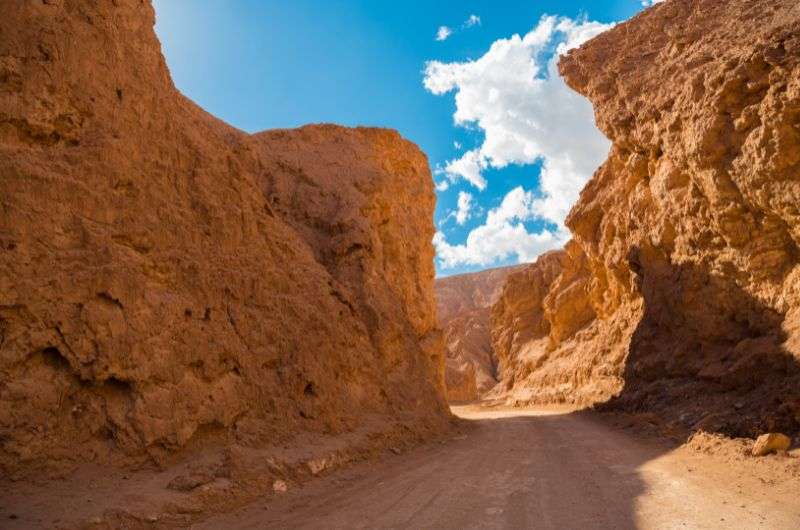
Valle de Martes
Distance from San Pedro de Atacama: 3 km | 2 miles | 8-minute drive
Very similar to Moon Valley is Mars Valley (Valle de Marte), located just a few kilometers outside San Pedro de Atacama. This rocky, windswept terrain is full of silence and towering sand dunes—making it a favorite spot for travelers to try sandboarding for the first time.
It’s a surreal experience to glide down these natural dunes surrounded by a landscape that looks straight out of a sci-fi movie. Unfortunately, I didn’t have enough time to try it myself, but it’s definitely going on the "next time" list.
Fun fact: The name "Death Valley" (Valle de la Muerte) is actually the result of a linguistic mix-up. In Spanish, the area was originally called "Valle de Marte" (Mars Valley) due to its resemblance to the Red Planet. Over time, the name was distorted into "Valle de la Muerte" (The Valley of Death), which—let’s face it—sounds way more dramatic and definitely better for marketing.
Practical tips: If sandboarding isn’t your thing, it’s also a great spot for sunset walks and jaw-dropping photo ops. Don’t forget to bring water, sunscreen, and a sense of adventure!
10. Moon Valley (Valle de la Luna)
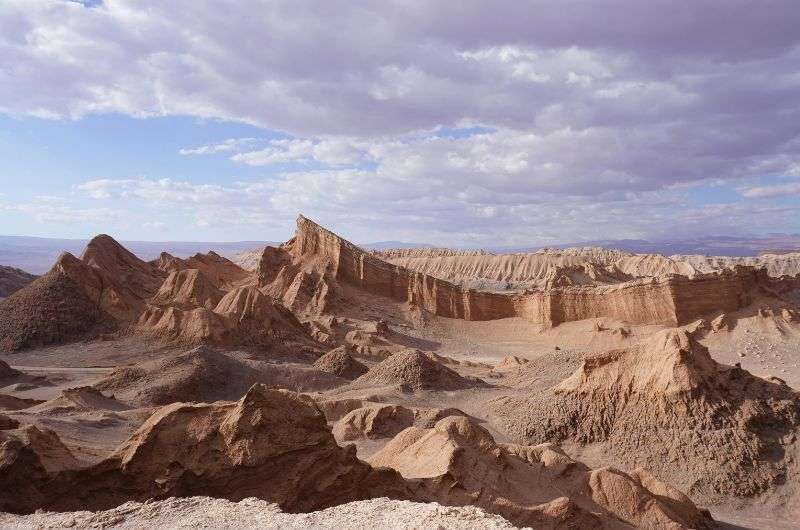
Valle de la Luna
Distance from San Pedro de Atacama: 6 km | 3.7 miles | 10-minute drive (to the visitors' center)
Hotel splurge option: Tierra Atacama (it’s on the south side of San Pedro, i.e. conveniently located for Moon Valley)
Have you ever wondered how Neil Armstrong felt after landing on the Moon? Well, in San Pedro de Atacama, you can get pretty close to that feeling—or at least I imagine so. The Valley of the Moon (Valle de la Luna) is a vast, sedimentary plateau just beyond the streets of San Pedro de Atacama. While the entire area around San Pedro de Atacama resembles a mysterious moonscape, the sunset at Valle de la Luna is truly otherworldly and unforgettable.
Moon Valley is part of the Los Flamencos National Reserve, which is known for its unique salt flats and stunning sculptural rock formations. These surreal shapes have been carved out over thousands of years by the folding of volcanic terrain under salty water, which streams down the hills to the lagoons after rare rainfalls.
However, don’t expect any humidity here—the place is drier than British humor, making it one of the most inhospitable places on Earth. But despite its harshness, the breathtaking play of colors at sunset is something you absolutely shouldn’t miss!
Points of interest:
- Tres Marías (Three Marias rock formation)
- Duna Mayor (The Great Dune)
- Mirador Achaches (scenic viewpoint)
- Mirador de Kari – Piedra del Coyote (another stunning viewpoint)
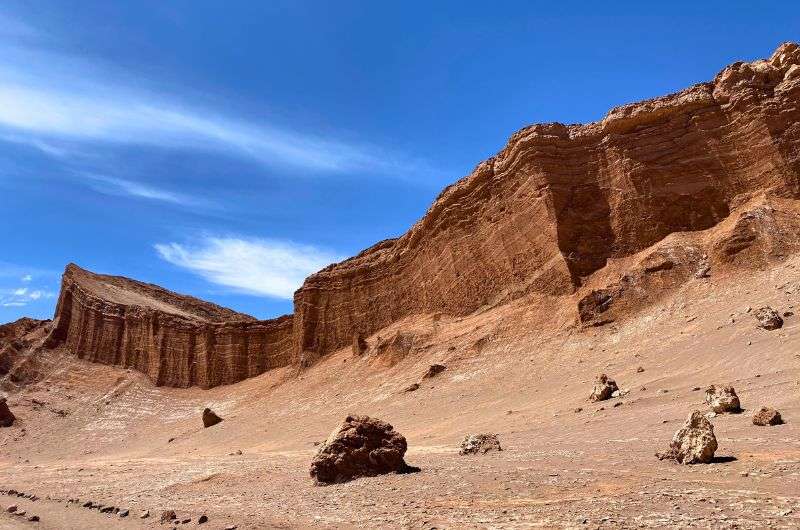
It really feels otherworldly @ Valle de la Luna
How do you get to the Valley of the Moon?
To visit the Valle de la Luna, you need to either book a tour with a guide (that includes a bus ride), rent a bike, or get there on foot. I would just like to point out that the walk may be extremely unpleasant in the burning sun, so remember to bring enough water. That said, hiking in Chile is always somehow more interesting than in most other places on Earth!
Guided tours: prices and booking
There are many tour operators offering various tour packages to Valley of the Moon. And thanks to natural competition, you don’t need to worry too much about bad quality agencies. I find it best to book a tour online, but you can also find yours in person in San Pedro de Atacama after arrival. The average price is USD 45–65 for a 5-hour tour.
The Moon Valley Trail
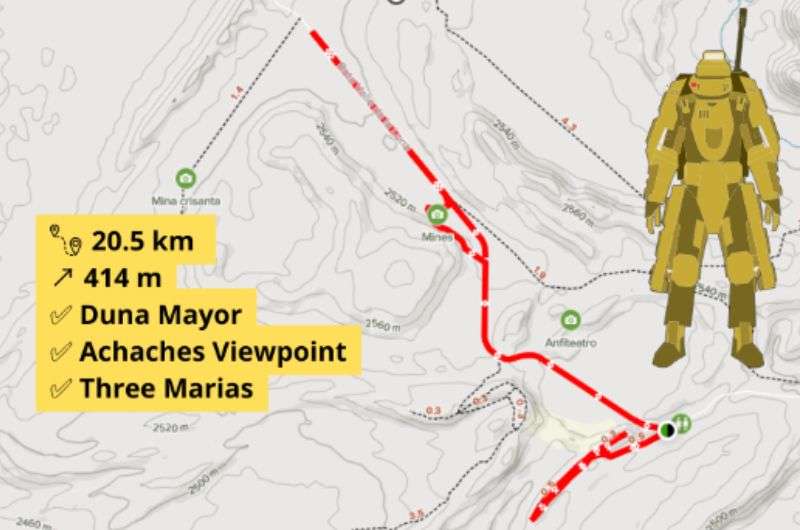
This is how you get there!
This trail includes all the best spots to admire in these vast desert plains, either by foot or on bike. The hike takes 5 to 6 hours, there’s only mild elevation (414 m/1 360 ft), but it’s still around 20 km (12.7 mi) in the desert.
I strongly recommend planning your trip for an afternoon, so that you will be coming back as the sun is going down. That way you get the most stunning photos. The evenings are also cooler, which makes for much better hiking conditions.
Conclusion
San Pedro de Atacama is a true gem in Chile, offering a mix of stunning landscapes, unique wildlife, and fascinating culture. Whether you’re exploring geysers, lagoons, or ancient ruins, the things to do in San Pedro de Atacama will leave you in awe.
Atacama Desert facts
- Earthquakes happen all the time: San Pedro de Atacama sits on desert plateau surrounded by volcanos and the Andes, which are perfect seismic conditions. Tremors between 4.0 and 5.0 happen almost daily, which got me kind of excited—I’d never been in an earthquake! I even downloaded a Chilean earthquake app, but apparently, I’m so good at sleeping, I snoozed right through it.
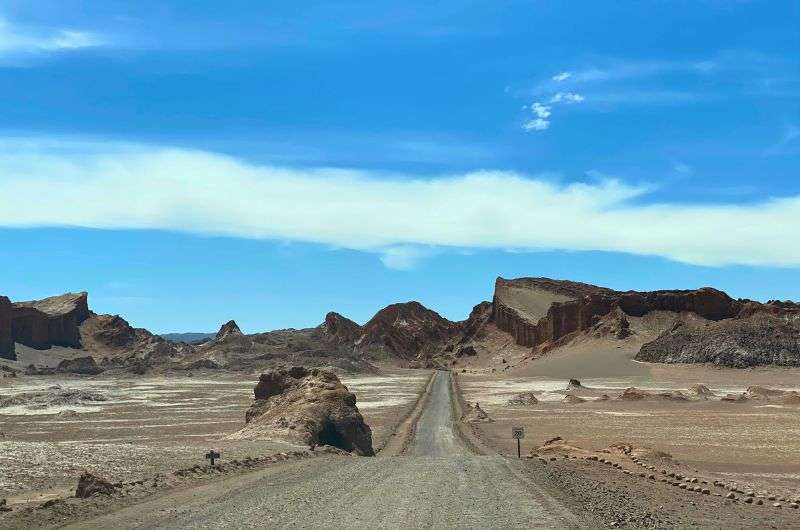
A very dry and desolate place. But still extremely interesting!
- It’s (almost) the driest place on Earth: Parts of the Atacama Desert haven’t seen a drop of rain in centuries (or ever!), making it one of the driest places on Earth. That said, it’s a large area and San Pedro de Atacama does get the occasional sprinkle during the Altiplanic winter (January and February).
- Welcome to Earth’s Mars: The Atacama is so dry and alien-looking that NASA uses it to test Mars rovers. Walking through the desert, I half expected Matt Damon to pop out holding a bag of potatoes.
- The stars are out of this world: With high altitude and no light pollution, the Atacama is also famous for its crystal-clear skies, making it one of the best places in the world for stargazing tours.
- El Tatio Geysers are the world’s highest: Located at 4,320 m (14,170 ft), these steamy geysers are a sunrise must-see. Just don’t step too close to those boiling pools!
- The mummies beat Egypt’s: The Atacama’s Chinchorro mummies are over 7,000 years old, making them the oldest in the world. Dry desert air = nature’s best embalmer.
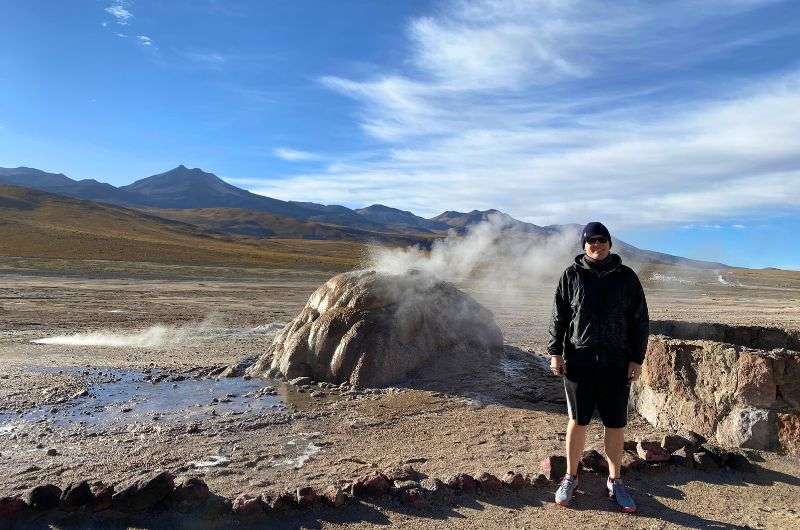
And that’s a wrap on San Pedro and the Atacama Desert!
You might also be interested in reading:
- 3 Weeks in Chile: The Ultimate Travel Itinerary
- All You Need to Know About Traveling to Chile: 15 Tips and Tricks
- All You Need to Know About Climbing Villarrica in 4 Steps
- 8 Highlights from my Visit to Patagonia
- 20 Best Day Hikes in Chile of Various Difficulties
Sometimes, all you need to do is take the first step... I've filtered out the best hotels in San Pedro de Atacama for you
Save it for yourself to come back to later, or share with your friends on social media!
I've already planned your ititnerary for the trip, complete with my travel tips.
This post contains affiliate links. I earn a small commission if you make bookings through my links, at no additional cost to you. Thank you for your support!




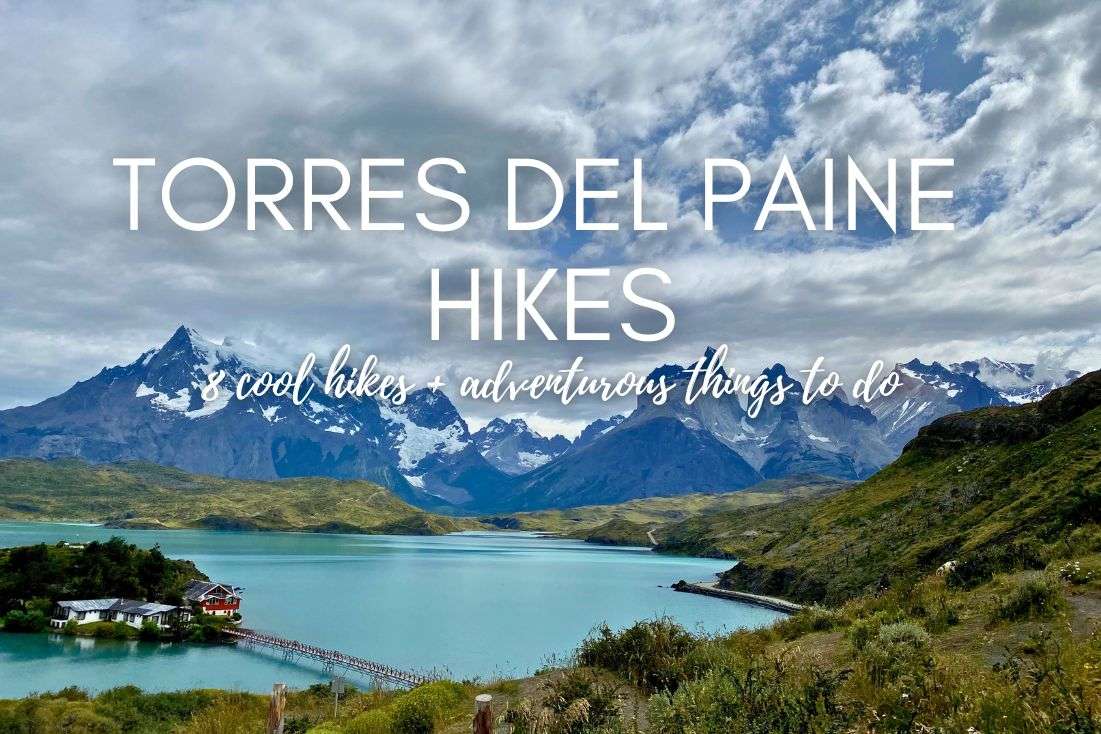

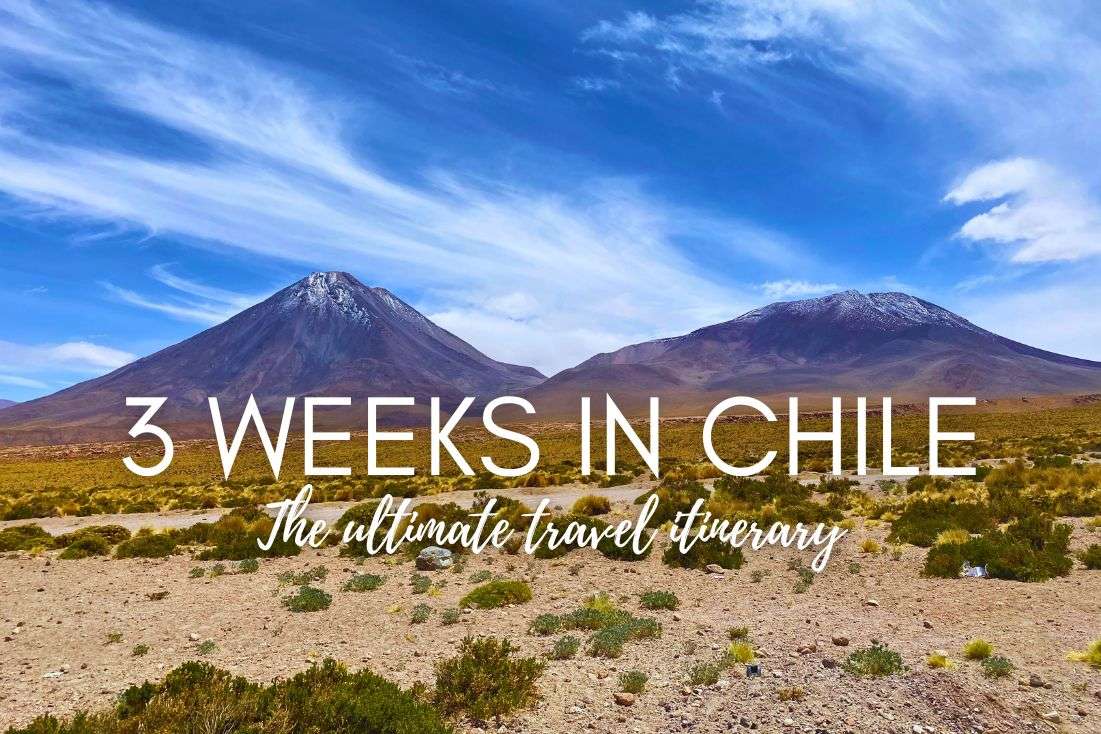



Comments | Thoughts? Give us a shout!